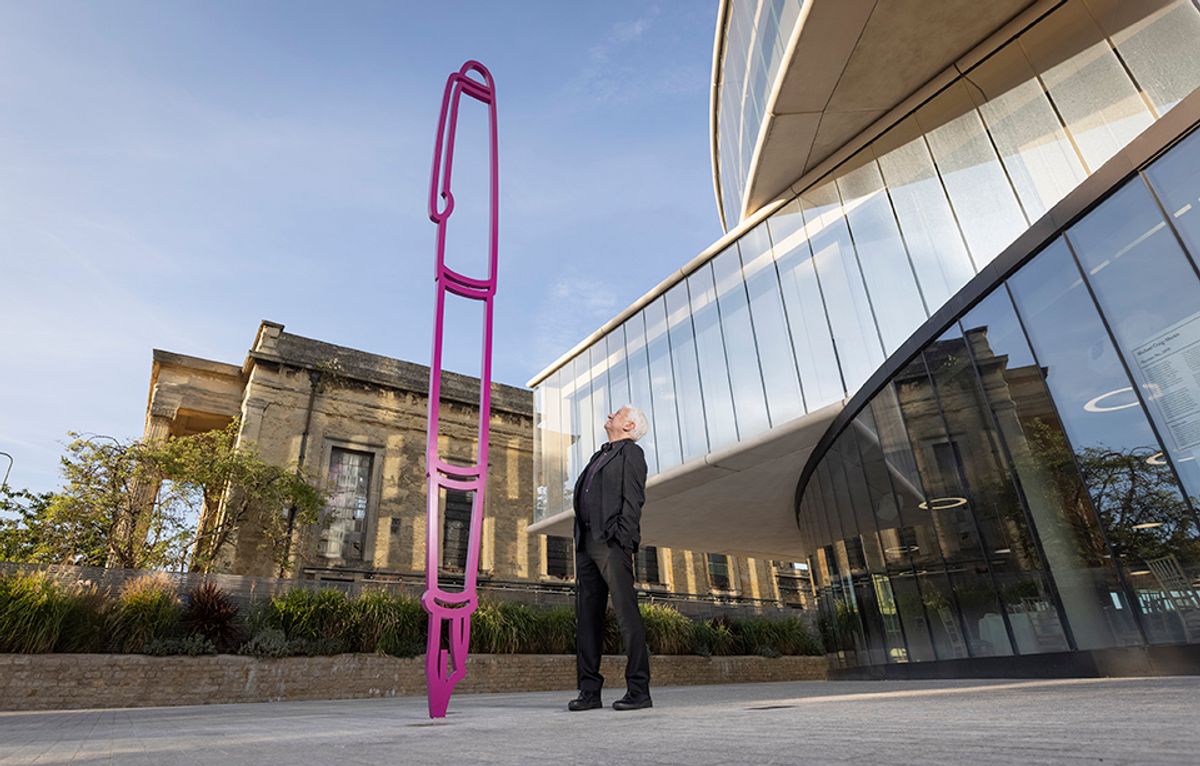The Irish-British artist Michael Craig-Martin today unveiled the tallest, heaviest and “most daring” sculpture he has ever produced, outside the University of Oxford’s Blavatnik School of Government.
And what object could better symbolise such erudite surroundings than a fountain pen, powder-coated in magenta pigment?
“The fountain pen is one of those few objects that is old fashioned, it refers to the past, but it is also a current object,” Craig-Martin says. “We still sign documents with fountain pens, there’s a grandeur to it. Whenever the American president signs a bill, he always gives away a lot of fountain pens.”
But, for Craig-Martin, who famously mentored the YBAs, his sculpture is not only intended to inspire university students. The work has been installed in the historic suburb of Jericho, which is largely residential. “It’s right on the border between the university and the rest of the city, so it has meaning in relation to the university, but it also has meaning to school kids,” the artist says. “It’s not an image that is exclusive—it’s accessible to all.”
Created during lockdown, when many sculptors faced problems with the supply of materials and access to studios, Craig-Martin’s Fountain Pen was only delayed by six months. Though, at five metres-tall, it was, he says, “technically challenging”.
Balanced on the nib, Craig-Martin says he had to double the thickness of the galvanised steel (25mm to 50mm) so that the sculpture can withstand its very public surroundings. As he puts it: “Previously, I have made sculptures for people’s properties or gardens, or, if they are in a public space, they are not there for long. Whereas this really is a permanent work, so it’s much grander and much heavier than any sculpture I’ve ever done before.”
Unveiling the work today, a week before students return to Oxford and at “a turning point in the pandemic” is significant for Craig-Martin. “It’s a welcoming gesture,” he says. “I’ve noticed, as people gather again, there’s a real joy in people seeing people they haven’t seen for a long time.”
The Blavatnik School of Government, Europe’s first major school of public policy which was founded in 2010, is itself a “real forum of ideas”, Craig-Martin says. The school was established with a £75m donation from the Ukraine-born billionaire Leonard Blavatnik, supported by £26m from the University of Oxford.
Blavatnik’s donation—one of the largest in the history of the university—came under scrutiny in 2017 when Bo Rothstein, a leading political academic, quit the University of Oxford after it emerged that Blavatnik had donated $1m to Donald Trump’s inauguration committee. A spokesperson for Blavatnik told the Guardian newspaper that his gift was for the committee that has been responsible for organising US presidential inaugurations since 1901. Blavatnik’s donations to Tate Modern and the Victoria & Albert Museum have also been criticised due to the billionaire’s links to the Russian president Vladimir Putin.
Craig-Martin notes that, in the absence of public money for the arts, “many institutions are dependent on philanthropy from very wealthy individuals”. The artist adds that the Herzog & de Meuron-designed school itself is a “wonderful and important institution” that brings together people from across the globe.
“There are few things more important in our modern, fractured world than having young people come together, and then go out into the world and maybe in 20, 30 or 40 years, those relationships they made in Oxford will have a positive significance.”


